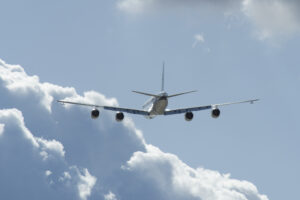Russia Approves Additional Overflight Permits For U.S. Airlines

(Article text ©2021 RFE/RL, Inc., Radio Free Europe/Radio Liberty – rferl.org – Oct. 29, 2021 – article text also appeared at rferl.org/a/russia-overflight-us-airlines/31534911.html)
The United States says Russia has approved U.S. airlines’ requests for more overflight permits after some passenger and cargo carriers sent a letter “urgently” asking for the State Department’s help in dealing with Moscow.
The State Department late on October 28 confirmed it received the letter and said that “Russia approved U.S. carriers’ applications for overflights last week.“
“The Department of State continues to engage with the relevant Russian authorities to secure expanded air services opportunities for U.S. carriers,” it said.
U.S.-Russian relations are at a post-Cold War low, with a variety of security, commercial, and diplomatic issues separating Moscow and Washington.
International airlines make hundreds of flights over eastern Russia each week, a short route to South Asia. Airlines are required to receive permission from a country’s civil aviation authority to travel through its airspace on passenger and cargo flights.
Airlines for America, a trade group representing major U.S. passenger and cargo carriers, on October 14 asked the State Department to “act urgently” to address the needs of airlines to secure rights to overfly Russian airspace, Reuters reported.
The group — which represents American Airlines, Delta Airlines, United Airlines, FedEx Corp, United Parcel Service, and others — asked Secretary of State Antony Blinken to intervene, warning that without action they could be put at a competitive disadvantage.
“Many U.S. airlines urgently need additional rights to overfly Russian airspace to meet market demands,” the letter said.
Without additional rights, it said, “U.S. airlines will be forced to operate on alternate, inefficient routes resulting in time penalties, technical stops, excess CO2 emissions, and loss of historic slot rights.”
Nicholas Calio, chief of the airline association, wrote in the letter that “U.S. passenger airlines need additional Russian overflights to operate efficiently from the U.S. to destinations in Asia, India, and the Middle East.”
He added that “U.S. all-cargo carriers need restoration of overflight rights on all-cargo routes between points in Europe and Asia that were mutually agreed upon but were unilaterally stripped away by the Russian government.”
“U.S. carriers may need to consider mitigation measures, including schedule reductions. This outcome would make U.S. carriers far less competitive globally … and will exacerbate the growing backlog of cargo and express shipments needed to reduce the pressure on the supply chain,” Calio wrote.
The State Department did not say how many overflights had been approved.
United late on October 28 said it “has received the necessary overflight approvals from Russian authorities to continue operating our nonstop flights to India this winter without interruption.”
The Russia’s embassy in Washington did not respond to requests for comment. The airline group did not comment following the State Department statement.
